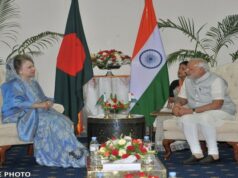In this compelling excerpt from our interview with Amoko Ben, a Sudanese who is now in South Sudan, working as a senior officer in the Immigration Department, we delve into the ongoing humanitarian crisis in Sudan, described as one of the severest crises of the 21st century. Amoko Ben provides an eye-opening update on the dire situation on the ground, where millions of people face death daily, and mass displacement continues unabated.
Amoko Ben describes the scene at the border between Uganda and South Sudan, where buses filled with refugees arrive at camps every day, underscoring the scale of the crisis. Similarly, Juba International Airport sees a constant stream of people fleeing the country, highlighting the widespread impact on all demographics, including women and children.
The interview touches on the critical issue of international attention and aid. Ben points out that Sudan has been under severe sanctions for years, particularly from the United States, which hampers media coverage and international assistance. The sanctions have created a media blackout, limiting global awareness and response to the crisis. Ben emphasizes the need for increased international focus, viewing our interview as a rare opportunity to shed light on Sudan’s plight.
Looking forward, Amoko Ben expresses uncertainty about the future, given the entrenched positions of the paramilitary rebels and the army. While the rebels control significant areas on the ground, the army dominates the airspace, leading to continued conflict. Ben stresses that international pressure on the army is crucial for any potential resolution, as some Sudanese forces are open to negotiations.
Finally, Amoko Ben highlights the profound desire for peace among the Sudanese people. Whether through civilian rule or military governance, the primary wish of the population is to return to normal life. This interview provides a poignant insight into the human cost of the conflict and the urgent need for international action to support peace efforts in Sudan.
Neelanjana Banerjee is a Broadcast Media Specialist with 23 years of cross-media experience in designing and producing content for television, radio and online media.
Having held a wide range of roles in various aspects of electronic media, she is a multifaceted professional and has an in-depth and hands on experience in broadcast
content, programming, media production, channel / product launch, TV and
radio skills training and online content.
Neelanjana was awarded the Chevening Gurukul fellowship in Leadership & Excellence from King's College, London in 2016.




